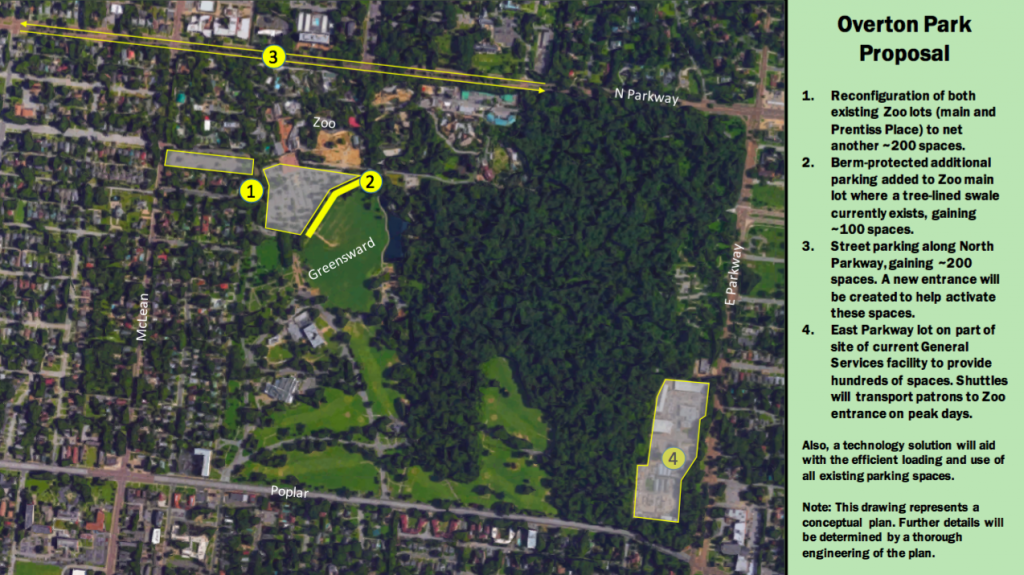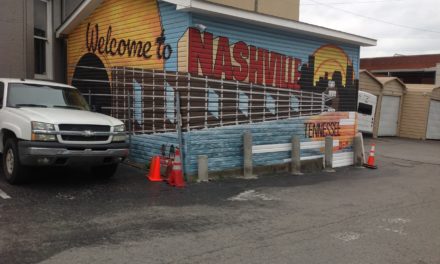We cannot remember an interview process by the City of Memphis like the one Friday for the three teams vying for a contract to implement the zoo parking plan in Overton Park.
Six months ago, we wrote: “It could well be that we look back to today’s decision regarding zoo parking on Overton Park’s greensward as the seminal moment when we came face-to-face with the brand of leadership that Jim Strickland brought to the mayor’s office.” That was when the mayor announced a proposal to resolve the emotional controversy and was lauded in a statement by the Overton Park Alliance.
Mayor Strickland returned to the scene of that triumph in creating the innovative approach to selecting a professional team that unfolded for six hours Friday. It wasn’t just that the process was open to the public, he also called for the process to include 30 minutes for each of the three teams to be interviewed by the public – A2H, Powers Hill Design LLC, and Kimley-Horn and Associates Inc.
City of Memphis sent out Requests for Qualifications (RFQ) that produced eight responses before the three finalists were selected by the Memphis Zoo Parking Project Steering Committee. The RFQ said: “The design will include the expansion of the existing main parking lot and also the expansion of the existing lot that fronts along Prentiss Place to provide an additional 415 parking spaces. The design of the expanded parking lot will be ADA compliant.”
Opening Up The Process
The zoo parking steering committee members are Manny Belen or Jack Stevenson, City Engineering; John Conroy, Memphis Zoo; Robert Knecht (or alternate), City of Memphis Public Works; Doug McGowen (or alternate), City of Memphis Chief Operating Officer; Maria Munoz-Blanco or Mike Flowers, City of Memphis Division of Parks and Neighborhoods; Michael Rowland, community representative; Jennifer Sink (or alternate), City of Memphis Law Division; Tina Sullivan (or alternate), Overton Park Conservancy; Mary Wilder, Overton Park Alliance, and Communications Liaison Kyle Veazey, City of Memphis Communications Office.
In support of the process, the mayor’s office created a page on the city’s website where a timeline, meeting minutes, updates, and other information are posted. The page even includes the score sheets by individual committee members for each of the eight firms that responded to the RFQ as well as a way for the public to share their opinions at any time.
All in all, the process since Mayor Strickland made the original announcement about a settlement has shown a continuing sensitivity to the volatility of the greensward issue and an emphasis on shining a light on the process to prevent conspiracy theories and rumors.
In the intervening months since the settlement announcement, the Memphis Zoo has sustained its obdurate attitudes and greensward advocates’ attention has only intensified, making Mayor Strickland’s open process a safety valve to put the main parties in the room at the same time. Hopefully, the ultimate success will be in reaching a final determination that addresses zoo parking while once and for all, protecting the integrity of the park as a whole.
10 Parks That Matter
Ongoing events in Overton Park continue to attract national attention as other cities deal with the problem of parkland taken for zoo parking. Interest in how things play out in Memphis is amplified by it being named on a PBS program as one of the “10 Parks That Changed America.”
Sometimes we act blasé about Memphis’ impact on the social and cultural history of the United States, and while we do of course cite music, entrepreneurial innovation, and cancer research at St. Jude Children’s Research Hospital, we often overlook our rich parks history, notably Overton Park and Shelby Farms Park.
Taken for granted for decades and invigorated by renewed visions by new conservancies intent on not just preserving the green space for the public but improving options at the parks, their management, their quality of place, and their magnificent, irreplaceable forests. (Martin Luther King Jr. Riverside Park awaits its well-deserved moment in the sun.)
The 10 parks spotlighted on PBS were stories about “visionaries who took open canvases of God-forsaken land, and transformed them into serene spaces that offer city dwellers a respite from the hustle and bustle of urban life…each story introduces the heroes who brought these parks to life, and the villains who preferred to exploit the land for private enterprise. Discover the evolution of our nation’s city parks, and learn the history of landscape architecture – an American-born art in which human beings try their best to mimic nature.”
An Iconic Park
It’s a distinctly Memphis story and one of the proudest chapters of the city’s history as citizens joined together to defeat business and civic leaders intent at building an interstate highway through Overton Park and to create new federal law regarding parkland. It is within this historic context that it is easy to understand the flashpoint that accompanies threats to the 342-acre park.
As a result, Peter Harnik, the national expert on urban parks, mentioned Overton Park in his retirement speech to the National Recreation and Park Association National Conference last October: “So, for those of you who have been following the rather unbelievable battle in Memphis between the Memphis Zoo and the Overton Park Conservancy over what I call ‘automobile storage on the park’s historic lawn,’ an old-fashioned headline could be: ‘Zoological Park Treats Park as Car Park.’”
In Planning, American Planning Association’s magazine, Overton Park was again spotlighted as one of the zoos illustrating the tensions between an iconic park and a zoo. “Memphis is ground zero in the war, or maybe ‘zero ground’ from the park perspective,” it said.
“While other cities battle over pavement, in Memphis, the zoo leadership has gradually since the 1990s commandeered the park’s ceremonial lawn – designed back in 1901 by world-famous landscape architect George Kessler – for cars. For years, on pretty days, nearly zero percent of Overton Park’s historic Greensward was available for strolling, picnicking, sunbathing, playing all, or doing anything else. Rather than a sea of tranquility, the lawn served as an ocean of traffic – the overflow lot for patrons of the Memphis Zoo.”
Overton Park’s Relevance
The article suggests that Overton Park struggle is “extreme” but “not unique.”
Similar issues are taking place at the San Diego Zoo (tied for busiest zoo in the country) in Balboa Park, where a 4,800-space underground garage is planned; St. Louis Zoo, which is moving parking out of Forest Park altogether; St. Paul’s Como Park Zoo in Como Regional Park, which has a free shuttle taking visitors a mile away to the fairgrounds at a yearly cost of $150,000; Buffalo Zoo in Delaware Park, where decades of tension gave way to a limited shuttle when the zoo’s idea to build a garage that would take down 200 old growth trees was rejected; and Portland Oregon’s Zoo in Washington Park, which offers a free, parkwide shuttle.
While there was the assumption that the Memphis Zoo would develop a solution for its parking demands, that did not happen, the article said, and as a result, the “battle was finally brought to an end through the intercession of Mayor Jim Strickland.” “The mayor’s solution, based on a detailed 2016 parking study commissioned by the Overton Park Conservancy includes a complete redesign of the zoo’s existing parking to add more spaces (albeit cutting down some trees in the process), paving a small portion of the park’s greensward for parking, adding hundreds of spaces along the formerly parking-free roadway outside the zoo, creating a new zoo front entrance away from the parking lot, and instituting shuttle service around the perimeter of the park.”
In the late 1960s, we often chanted, “the whole world is watching,” and these days, the whole urban park world is watching what is done here to one of America’s most important parks, and because of it, the open process set up by Mayor Strickland has the opportunity to have national implications.
**
Join us at the Smart City Memphis Facebook page for daily articles, reports, and commentaries relevant to Memphis.







The Zoo has gone downhill in recent years and the parking debacle has a lot to do with it. Why the city long ago didn’t have the foresight to build a nice parking deck nearby and provide continual shuttle buses or a tram to the Zoo entry is beyond me. The Zoo is one of the very few decent attractions that Memphis has to offer resident and visitors. It along with Overton Park are being squandered. So typical of Memphis. SAD!
It’s very unfortunate that the Memphis City Council, in a “last moment revision” inserted a clause to make the parking spaces in the Zoo’s lot 11-18% larger than necessary, rather than looking for the best solution.
On the other hand, it’s fortunate that the best of the Consultants have said that they can analyze different scenarios, and in fact they believe that to be one of their strengths.
Now it’s up to the Zoo Parking Committee and the City Council to decide whether they want the Consultants to develop the best solution, or whether the Consultants should be encumbered by the restrictive specifications of the City Council.
@38120
There IS a very nice parking garage at Overton Square. Two years ago the Overton Park Conservancy ran a free shuttle service from there to the zoo. The zoo refused to tell their patrons about it, tho, deeming it ‘impractical’.
Parking garage should be in the park near Zoo and Levitt Shell, not blocks away at Overton Square. It could be partially underground too. Anything is better than allowing parking on the greensward area
By the way, the Levitt Shell structure is just plain UGLY! Can’t something be done to improve it. It looks like a small town bandshell.
Only in Memphis!
Karen Casey, I remember the parking deck and shuttle program well. I think the zoo communicated it quite well, even devoting lots of ad space free of charge in its mailers and promoting it heavily inside the zoo. I think it didn’t get more riders because it wasn’t convenient. We did it twice and it was a disaster both times. Buses ran only once an hour or once every 2 hours (although they were advertised to be every 15 minutes), the a/c didn’t work on the buses (making summer use horrible), and we had to pay more for parking in the deck than we would have paid to park in the zoo lot. Zoo members really saw no incentive, because they gave up their free parking at the zoo only to pay at Overton Square.
The problem with various groups (OPC, Greensward groups, etc) is that they’re offering only ideas that fit their perspective without any consideration to who else is being affected, then acting incredulous when someone else doesn’t want to go along with it. For example, why would the Zoo go along with an idea that parks people off-site when the Zoo makes money from parking on-site? What’s the incentive for them to go along with you? What’s the incentive for zoo patrons to park in a far-off deck and wait 1-2 hrs for a shuttle, when they could simply park in front of the zoo and walk right in?
A successful compromise requires each side getting at least some of what it wants. If you don’t do that, you are met with resistance, which is precisely what happened with the zoo.